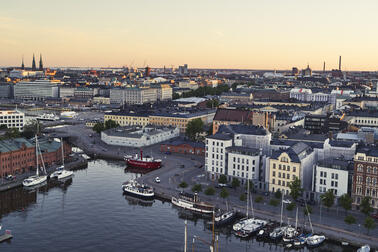
Helsinki invests a total of EUR 20 million in digitalisation, innovative circular economy business and entrepreneurship among higher education students and recent graduates. The investments are a response to the future megatrends that will shape not only Helsinki but the whole world.
In the post-corona world, competition among cities will be harsher. Helsinki’s characteristics allow it to improve its relative competitiveness. Functionality, safety and closeness to nature are things that many of the world’s metropoles will strive to offer in the future. To succeed in this competition, Helsinki must invest in it competitiveness while the coronavirus crisis is still going on.
According to its strategy, Helsinki aims to be the best city in the world in the utilisation of digitalisation. In a quickly changing world, Helsinki’s ability to take hold of the benefits offered by digitalisation development equips the City with new capacities to serve its residents, while creating new capabilities.
With the circular economy cluster programme Helsinki joins other public and private operators to speed up the establishment of the market for circular economy products and services. In addition, the City invests in youth entrepreneurship together with the higher education institutions of the region.
“The coronavirus crisis has been widely compared to the depression of the 1990s, especially when emphasising that the errors made then should not be repeated. Instead, earlier successes and lessons learnt are a resource worth utilising. Without the bold investments in R&D in the aftermath of the depression, the creation of new success stories would have been significantly more difficult. The ongoing crisis requires genuine course changes, too. Bold investments in the prerequisites of new growth paths and a more modern city are required this time also. In the present case, the most important thing in terms of the projects promoted through separate funding is their broad effectiveness,” says Mayor of Helsinki Jan Vapaavuori.
To achieve these goals, Helsinki has appropriated a total of EUR 20 million in separate funding for the City Board’s working cash balance in this year’s budget. Ca. 10 million euros will be allocated to digitalisation-promoting projects, and 10 million euros to industrial policy measures targeted at companies’ incubation activities and measures supporting the circular economy cluster. The City Board will decide on the allocation of funds in its meeting on 15 March.
Digitalisation projects support digitalisation leap, create better and more proactive services and reduce segregation
The goals of the recovery measures include the prevention of segregation and the improvement of the accessibility of services that promote non-discrimination. The renewal of the digital foundation and the development of data capabilities are essential prerequisites for the digitalisation leap of the City of Helsinki. The digitalisation leap facilitates the creation of a city that proactively responds to its residents’ service needs on their terms. The projects supported via the separate funding of 10 million euros will be implemented as part of the City of Helsinki’s digitalisation programme.
“We want to facilitate the everyday life of residents and businesses by offering more resident-oriented services regardless of time and place and through a proactive approach to providing services. Investments in digitalisation help with the recovery from the pandemic and strengthen Helsinki’s ability to react faster to changing situations. The projects to be started now will develop the digital services to be offered to residents ans businesses and build our data capabilities,” says Helsinki’s Chief Digital Officer Mikko Rusama.
The services for the residents are related e.g. to the development of digital support and the establishment of remote digital support as a form of operation. The need for remote support has increased particularly during the coronavirus epidemic. Digital support makes it possible for every resident to get help with the use of computers, tablets, smartphones, different applications or online services.
Segregation is prevented e.g. through better accessibility of early childhood education services, which is enabled by digital analytics. The digital processing of event notifications is also developed. The event sector has been strongly impacted by the coronavirus pandemic, and an easier permit application process will make the organisation of events easier in the future. The third project being started focuses on the improvement of elderly people’s well-being and functional capacity. Helsinki will support them through remote services and opportunities of cultural experiences and getting active.
Helsinki also wants to improve its ability to analyse coronavirus vaccinations and data. Coronavirus vaccine data is utilised in vaccination analytics, which promotes society’s faster recovery from the coronavirus-related restrictions. The building of data and analytics capabilities for the City are an important prerequisite for the success of the aforementioned projects.
The separately funded digitalisation-related projects will be implemented during 2021.
City invests heavily in incubation activities
The coronavirus crisis has hit service-driven economic regions like Helsinki particularly severely. Youth unemployment has also increased more than unemployment in general, as the hardest-hit sectors – the cultural, event organisation and service sectors – employ a lot of young people.
The City allocates 10 million euros for industrial policy measures with the aim of finding new ways to employ young people and support entrepreneurship, to continue the development of Helsinki’s promising startup sector and to ensure that young people also have the opportunity to receive support at the beginning of their entrepreneur career path.
Funding is allocated to the development of preincubation and incubation operations in the metropolitan area in cooperation with the higher education institutions, as well as to the utilisation of circular economy business opportunities and the strengthening of the sector’s competence cluster. In both cases, a further aim is to support the employment of recent graduates. In addition, funding is used for making cooperation between the City of Helsinki and large companies closer in order to create sustainable and intelligent solutions and develop new business based on them.
The project also facilitates the development of higher education campuses into innovation and business clusters and enhance Helsinki’s ability to attract international businesses and experts. 90 per cent of the programme’s funding is allocated for the operations of higher education institutions.
“The City of Helsinki wants to play a stronger role as an initiator of incubation activities and as a growth enabler for businesses. The higher education institutions play a key role in the development of competence, commercialisation and entrepreneurship culture. The goal of the incubator development project is to support growth opportunities and to create at least 100 new businesses a year,” says Helsinki’s Economic Development Director Marja-Leena
Rinkineva.
Development of circular economy – another important industrial policy goal
The goal of the circular economy cluster programme being launched is that Helsinki joins other public and private operators to speed up the establishment of the market for circular economy products and services.
Helsinki has already succeeded in pioneering e.g. the recycling of soil masses in construction, but the utilisation of circular economy in general is still at an early stage. With the cluster programme, the city wants to develop as a platform for new circular economy solutions and promote circular economy in its own procurement and investments.
Closer cooperation with large companies to create sustainable and intelligent solutions
Helsinki wants closer cooperation with large companies in order to develop sustainable and intelligent urban solutions. Apart from recovering from the coronavirus crisis, a further intention is to support the city’s goal of achieving carbon neutrality. Helsinki intends to reinforce its position as a top region for sustainable and intelligent urban solutions and related innovation activities. Simultaneously, the solutions to be developed can contribute to tackling the challenges caused by urbanisation, resource overconsumption and climate change, while attracting new businesses to the city.
The duration of the industrial policy projects is three years and they will continue until spring 2024.


